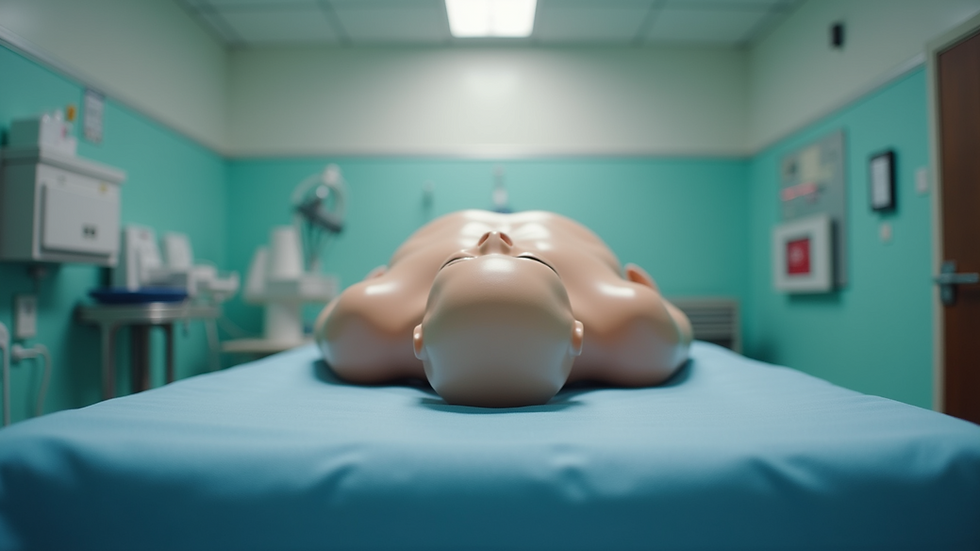Mastering Emergency Response Skills for Safety
- Anthony Dixon
- Nov 10, 2025
- 3 min read
Emergencies can happen anytime, anywhere. Being prepared with the right emergency response skills can make all the difference between chaos and calm, between harm and help. I’ve learned that mastering these skills is not just about knowing what to do but feeling confident enough to act quickly and effectively. Whether you’re a healthcare professional or a community member, having these life-saving abilities is essential.
Why Emergency Response Skills Matter
When an emergency strikes, every second counts. Knowing how to respond can save lives and reduce the severity of injuries. Emergency response skills include a range of actions such as performing CPR, controlling bleeding, and managing choking incidents. These skills empower you to provide immediate assistance before professional help arrives.
For example, if someone suddenly collapses, knowing how to perform CPR can keep their blood flowing and oxygen circulating until paramedics take over. Similarly, understanding how to use an automated external defibrillator (AED) can restart a heart in cardiac arrest. These are not just skills for healthcare workers; anyone can learn and apply them.
Practical tip: Start by learning basic first aid and CPR. Many local organizations offer courses that fit your schedule. Regular practice helps keep your skills sharp and your confidence high.

Building Your Emergency Response Skills
Developing emergency response skills is a step-by-step process. Here’s how I recommend you get started:
Take a certified course - Look for reputable programs that cover CPR, first aid, and AED use. For example, emergency response training provides hands-on experience and expert guidance.
Practice regularly - Skills like chest compressions and rescue breaths require muscle memory. Practicing on mannequins or with a partner helps.
Stay updated - Guidelines for emergency care can change. Refresh your knowledge every couple of years.
Prepare your environment - Keep a first aid kit and AED accessible at home, work, or community centers.
Learn to stay calm - Emotional control is key during emergencies. Practice breathing techniques and mental rehearsals to stay composed.
By following these steps, you’ll build a solid foundation that prepares you to act decisively when needed.
Essential Emergency Response Skills Everyone Should Know
Here are some core skills that I believe everyone should master:
CPR (Cardiopulmonary Resuscitation): Learn how to perform chest compressions and rescue breaths effectively.
Using an AED: Know how to operate an automated external defibrillator safely.
Choking relief: Understand the Heimlich maneuver for adults, children, and infants.
Bleeding control: Learn how to apply pressure, use bandages, and apply tourniquets if necessary.
Basic wound care: Clean and dress wounds to prevent infection.
Recognizing signs of stroke and heart attack: Early recognition can save lives by speeding up emergency response.
Each of these skills can be life-saving. For instance, if you see someone clutching their chest and struggling to breathe, recognizing a heart attack and calling emergency services immediately can be critical.
Practical tip: Keep a laminated quick-reference card with these steps in your wallet or phone for easy access during emergencies.

How to Stay Ready and Confident
Confidence comes from preparation. Here’s how I keep myself ready:
Regular drills: Practice emergency scenarios with family or coworkers.
Stay informed: Follow updates from trusted health organizations.
Equip your space: Make sure your home and workplace have well-stocked first aid kits and AEDs.
Encourage others: Share your knowledge and encourage friends and colleagues to get trained.
Know your limits: Understand when to provide care and when to call for professional help.
Remember, being prepared is not about being perfect. It’s about being ready to do your best when it matters most.
Becoming a Community Lifesaver
When more people in a community master emergency response skills, everyone benefits. I’ve seen how training sessions bring people together and create a safer environment. Heart Beats CPR Training in Lawrenceville is dedicated to making sure more people feel ready and confident to handle emergencies. They offer accessible courses and essential first aid supplies to empower the community.
By learning these skills, you become a vital link in the chain of survival. You can help neighbors, coworkers, and strangers in their moments of need. It’s a powerful way to give back and make your community stronger.
Practical tip: Consider organizing or attending group training sessions. It’s a great way to learn and build a support network.
Mastering emergency response skills is a journey worth taking. With the right training, practice, and mindset, you can be the calm in the storm and the help someone desperately needs. Start today, and you’ll be ready when it counts.



Comments